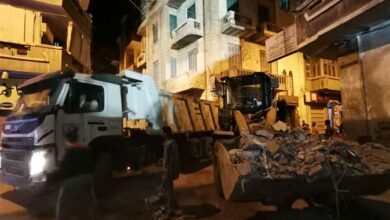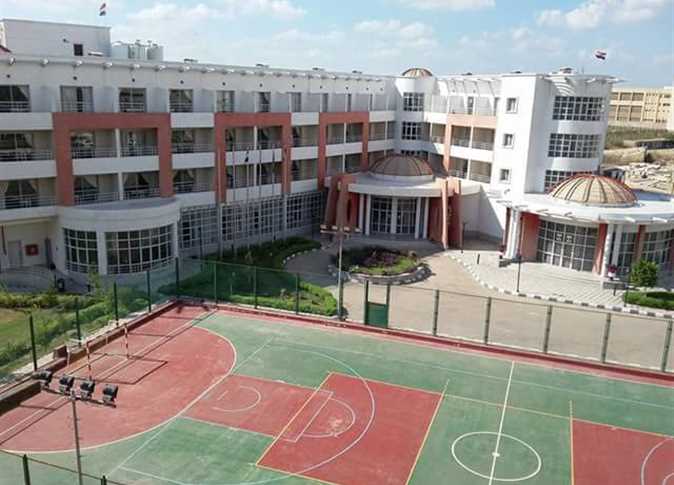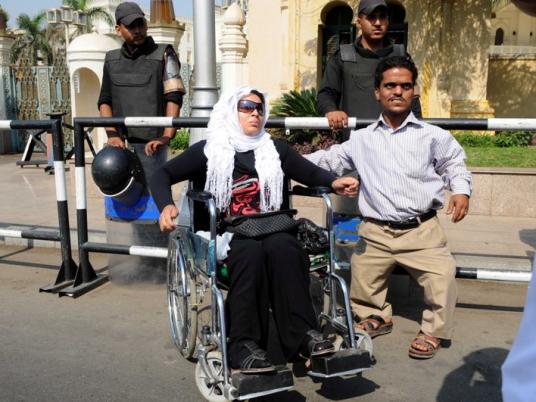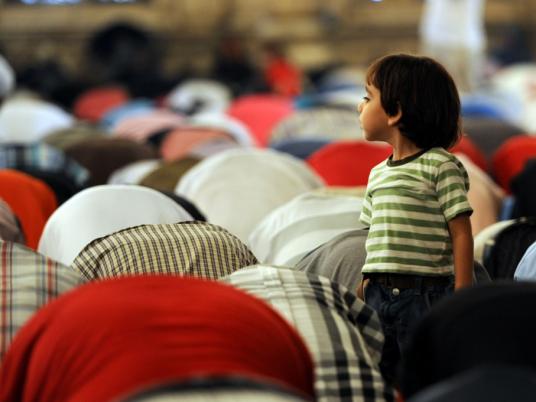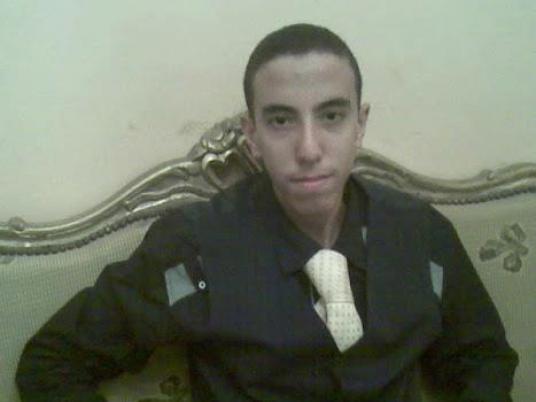
DAMANHOUR — It was strange for the media to go to the Delta city of Damanhour, the capital of Beheira Governorate, almost two years after the 25 January uprising. The city has not witnessed large-scale strikes or protests since.
But just three days after President Mohamed Morsy announced the contentious constitutional declaration in November, the scene quickly changed as tensions ran high between supporters and opponents.
The main square, Saa, and surrounding areas have been the scene of face-offs between different parties at different times — the police on one side, members of the Muslim Brotherhood on the other, the Popular Current and Constitution Party clashing with the former two, with thugs also in the mix, and remnants of the former regime at times stepping in.
It reached a boiling point, and 15-year-old Islam Fathy Massoud was killed Sunday after being hit on the head with a sharp object.
Spark of violence
The victim of divisions that have surfaced in the past week, thousands attended Massoud’s funeral march. Mourned by the Brotherhood as one of their own, he is seen as a martyr among revolutionary groups, along with Gaber Saleh, also known as Jika, who was pronounced dead the same night.
Their funeral marches took place at the same time Monday, one in Damanhour and the other in Cairo.
The group’s spokesperson in Beheira, Ahmed Nassar, says opponents to the Brotherhood wanted to demonstrate against Morsy’s declaration Saturday, but were joined by youngsters who started to throw stones at the Brotherhood premises.
The thugs of the National Democratic Party then showed up, he claims, incited by leading figures Alaa al-Sharqawy and Adel Mekkawy. Brotherhood members filed police reports against both.
He blames members of the Constitution Party and the Popular Current for provoking the torching of the Brotherhood office, mimicking similar incidents in Alexandria, Ismailia and Suez. The Brotherhood was prompted to stand in defense of their own premises the next day in the absence of police, and Massoud died at the hands of thugs who attacked.
But the shop owners in the area and protesters tell a different story.
They say the Brotherhood brought sticks, batons and bags filled with stones to defend their office, which provoked people to demonstrate against the group’s show of force and against what they say were biased police.
Massoud’s mother, Mona Badr, ended the debate about the Brotherhood’s responsibility for her son’s death by telling Egypt Independent that he went that day to defend the branch out of his own free will, and was not summoned by the group.
The Brotherhood supreme guide and Morsy’s wife visited Damanhour to pay their condolences to Massoud’s family, while the group refrained from demonstrating in support of Morsy’s declaration.
Meanwhile, civil groups staged demonstrated Tuesday rejecting the declaration, coinciding with demonstrations in Tahrir Square.
Change in scene
These demonstrations challenge the common assumption that the Brotherhood is the predominant active force in the Delta. They surprised unpoliticized residents of the typically serene city, which gave birth to late thinker Abdel Wahab al-Missiry.
The power struggle playing out in the city is emblematic in the very layout of the square, which houses the Brotherhood’s headquarters — the target of recent demonstrations — the former state security bureau, the Damanhour Police Department, the premises of the disbanded NDP turned ambulance center, as well as scattered shops and commercial centers.
“What is happening in the square is a settling of old accounts triggered by the constitutional declaration,” says Mostafa Sharaf, 28. “The Brotherhood helped demonstrators burn down the state security bureau, the [NDP] party premises and the police department during the revolution, and the only building left was the Brotherhood office.”
This tempted protesters, who see it as representing the group’s power in the area, Sharaf says.
However, interestingly enough, protesters made no attempt to set fire to the nearby headquarters of the Freedom and Justice Party, the Brotherhood’s political arm, nor did they target the birthplace of Hassan al-Banna, the group’s late founder, which lies just 16 kilometers away.
Ihab Helmy, a 24-year-old shop owner, says the Brotherhood behaves as if they own the square, and “this provoked the rest of the people.”
Representing the economic power in the square, shop owners are fed up with the situation in Damanhour, which, unlike neighboring villages, relies heavily on trade. The absence of desert does not allow for urbanization projects, resulting in a housing shortage and high youth unemployment.
Other shop owners see no reason for the Brotherhood’s branch to be torched.
The youth say Morsy must rescind the constitution, while the older ones say he should be given a chance so that stability can return and trade can flourish.
Nader al-Banna, 21, says Morsy must retreat because protests against him will not stop, and Egyptians will not accept “another dictator.”
On the other hand, Mamdouh Mansour, 51, says, “Morsy is purging the country of former Mubarak loyalists and we have to give him a chance. Enough with the protests, and let us work.”
One issue of consensus among all was their blaming security forces for the use of tear gas and their aggression toward protesters.
For Nassar, the rift between the two sides is a result of the heavy-handedness of security forces.
“Security forces fired tear gas on protesters at the very start of demonstrations, and it made it seem as if this is what the Brotherhood wants,” he says. “The Brotherhood is not against peaceful demonstrations.”
From the Popular Current, Hassan Saqr blames the police for complicity, saying Molotov cocktails were found in the garden of the square Friday, and the police have not taken steps to investigate who they belonged to.
Several shop owners say security always arrive late deliberately “so both sides can finish each other off.”
Balance of power
Damanhour, as in the rest of Beheira, is supposed to be a stronghold for Islamists, whether the Brotherhood or Salafis. Home to the second-oldest mosque in Egypt, it enjoys 6 percent of total voting power in the country.
The city, however, differs from the rest of the governorate in its urban nature. While the Brotherhood is the largest group in the city, they are not the most popular, even though there isn’t a viable alternative to their politics.
“The residents used to vote for the Brotherhood to spite the NDP,” explains Sharaf, “but they used to still win by fraud, which is what happened when Mostafa al-Fiqqi won in 2005.”
The group’s sheer numbers and their presence alone in the political sphere facilitated the Brotherhood’s victory in the last parliamentary election, in which Osama Suleiman and Gamal Hesham won by a landslide.
But this was not a real indicator of its popularity, which declined quickly afterward.
When the presidential election came along, the majority of voters chose Ahmed Shafiq in the runoff, while Morsy won the majority vote in surrounding villages.
“The center of their voting power is in the rural areas,” Sharaf says, but residents of the urban center still outnumber them.
He thinks individual candidates would fill the political void of the city, provided they rally in the nearby villages.
“We might vote for them to spite the Brotherhood this time,” he says.
Islam Hamid, a 25-year-old Brotherhood member, says the group is unpopular because the city was under the iron grip of former President Hosni Mubarak’s security apparatus. Heavy crackdowns on opposition forces succeeded in tarnishing the group’s image, thus enabling it to “become a center for feloul,” or remnants of the former regime, he adds.
Sharaf sees Damanhour as a city against partisanship whose residents are looking out for their livelihood in the absence of a viable alternative to the Brotherhood. Since the Popular Current and Constitution Party have no prominent figures, as the Brotherhood does, the void needs to be filled by independents voters can choose, he explains.
Political powers need to reach out to rural areas, he adds, and given the current divisions in the area, they have a chance to gain popularity.
Refaat Sharaf, 60, says Morsy and the Brotherhood are politically ignorant. But if no alternative statesman appears, “we will have to accept democracy and wait for four years to change the rules.”
As for the police, he says, they are not with Morsy — instead, they are “waiting for the remnants of the former regime to return.”
This story was translated by Ibrahim Hab el-Roman.
This piece appears in Egypt Independent's weekly print edition.

